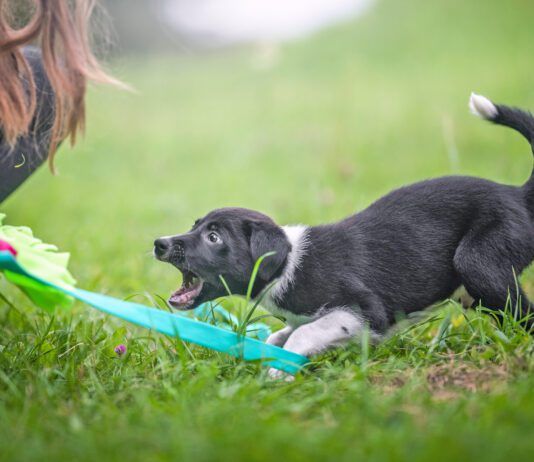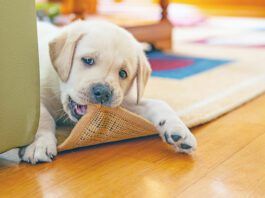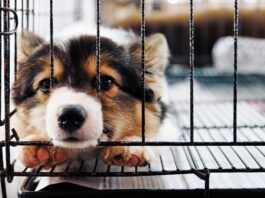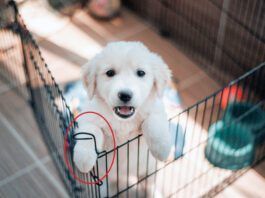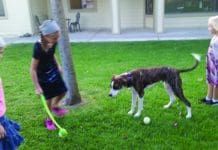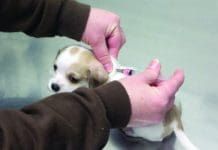Teaching Your Puppy Bite Inhibition
Some puppies have a naturally soft bite; some joyfully shred flesh without a hint of malice as they engage in normal interactions with the...
4 Puppy Biting Survival Strategies
Puppies! Who doesn't love 'em? They're cute, cuddly, and silly. They look like little angels when they sleep, which is often. When they're awake,...
The Complete Puppy Socialization Guide
Socializing is more than just getting your puppy out and about and having him meet lots of people and animals. The way a puppy is socialized is just as important. It is the quality of the exposure that counts (not the quantity!). Your pup doesn't need to have prolonged or close contact with new things or people. He just needs to have easy, happy experiences. The more relaxed your pup is, the better.
9 Things To Do if Your Puppy Has Kennel Cough
Kennel cough, or tracheobronchitis, is comparable to the common cold in humans. Nevertheless, it is frightening to many new dog guardians to discover that their puppy or newly rescued dog has contracted the disease. An unrelenting goose-like cough is the hallmark of kennel cough in dogs, but fortunately, most cases are treated successfully at home. To ensure your puppy recovers from kennel cough in a minimal amount of time and without complication, Whole Dog Journal has outlined the necessary steps you, the concerned guardian, need to take.
Giardiasis and Coccidiosis in Puppies
Two of the most frustrating but common parasites your puppy might be hosting are Giardia and Coccidia. These are not worms, but two species of protozoa -- single-celled organisms that reproduce in the intestines of infected animals and shed their spores into the environment through the infected animals' feces. These spores can survive in watery environments and soil, long enough to be incidentally consumed by other animals, either by drinking contaminated water, eating contaminated grass, or just walking through (or sitting or lying on) contaminated soil and then grooming themselves.
Raising a Well-Adjusted Puppy
I used to pride myself on the fact that I had never been a so-called "foster failure." As most of you probably know, that's...
Canine Parvovirus Vaccine, Symptoms, and Treatment
How is parvo spread among dogs? Whole Dog Journal discusses a number of canine parvovirus prevention and treatment approaches taken by veterinarians and dog guardians today. Reactions to parvovirus vary widely. In a world where parvovirus is literally everywhere, parvo kills some dogs and leaves others unscathed. And in the debate about parvo vaccination, some people vaccinate their dogs early and often, while others refuse to vaccinate against parvo at all.
Puppy Vaccines: Why Your Puppy Needs So Many Shots
Puppy vaccine schedules can be daunting to new dog owners. Why do puppies need so many shots? Are all those puppy vaccinations really necessary? Most veterinarians recommend that puppies are vaccinated for distemper, parvovirus, and adenovirus (hepatitis) a number of times, starting when they are about four to six weeks old, and again every three or four weeks, with their last puppy vaccination" given after they are about 16 to 20 weeks old. "
8 Steps to a Behaviorally Healthy Dog
You can start the process of socializing and training at any stage of a dog's life! Making positive associations for your dog is faster and easier for youngsters than adults, but it's always worth trying to teach new ways of thinking that will improve your dog's quality of life and overall happiness.
The 10 Most Important Things to Teach A Puppy
I don't care what breed or mix of breeds you're talking about, puppies are inarguably, impossibly and adorably cute. You have to be pretty...
Puppy Training Pros and Cons
Last month, I mentioned how concerned my son was when he heard I had made the decision to adopt one of the bully-breed-mix puppies I had been fostering. He's accustomed to me pretending that I don't like puppies (Ew
Take Control of Puppy Chewing
Why do puppies chew? They chew to explore the world, and to relieve the pain and irritation of teething. But they also chew because it's a natural, normal activity for all canines, young and old. While puppies do eventually grow up and get past the stage where they feel compelled to put their teeth on everything they see, mature dogs also need to chew to exercise their jaws, massage their gums, clean their teeth, and to relieve stress and boredom.


